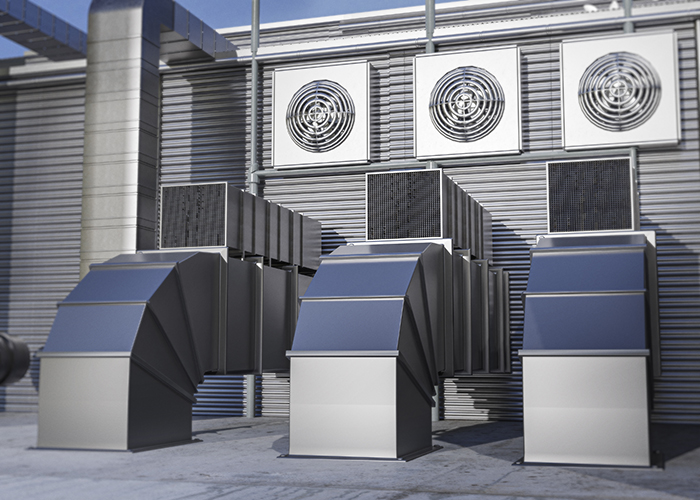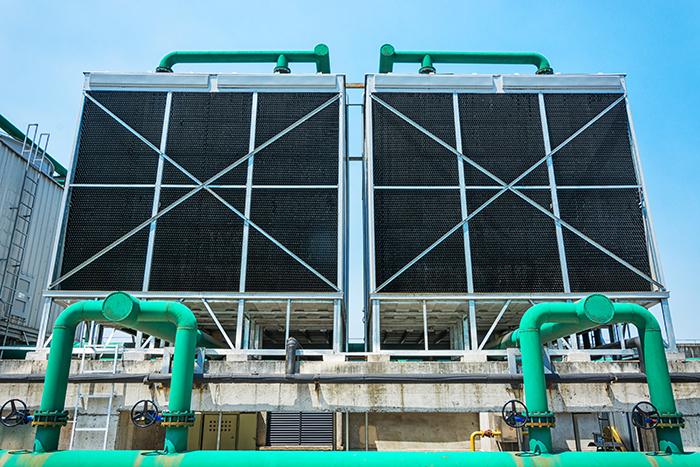A hydraulic oil heat exchanger is a critical component used to manage the temperature of hydraulic oil in various industrial and machinery applications. Arabian Automation specializes in manufacturing hydraulic oil heat exchangers of various types to cater to the diverse needs of its customers. Here are some key details about hydraulic oil heat exchangers and their types:
Hydraulic Oil Heat Exchanger: A hydraulic oil heat exchanger is a device designed to regulate the temperature of hydraulic fluid or oil in hydraulic systems. Controlling the oil temperature is essential for maintaining system efficiency and preventing damage caused by excessive heat. These heat exchangers function by transferring heat from the hot hydraulic oil to a cooling medium (typically air or water) through a heat exchange process.
Types of Hydraulic Oil Heat Exchangers: Arabian Automation offers various types of hydraulic oil heat exchangers, each designed for specific applications:
These are shell and tube type oil coolers, since they use water as the heat conductor and the main mechanism for water cooling is convective heat transfer.
1.Oil flow handling up to 1000 LPM
2.Cooling capacity up to 350000 Kcal/hr
Air cooled heat exchangers / oil coolers are lower in cost and maintenance, and can come in very small sizes depending upon the requirement, and still be effective. Water, on the other hand, has a higher specific heat capacity, density and thermal conductivity, and hence has a greater cooling capacity. Furthermore, the water jacket around an engine is very effective in significantly dampening the mechanical noises.
On the flip side, water cooled heat exchangers / oil coolers are comparatively more expensive than an air cooled heat exchanger / oil cooler. Water also accelerates corrosion of metal parts, and is a favourable medium for biological growth – both of these disadvantages further add to maintenance costs.
Not sure which kind of heat exchanger / oil cooler

Air-cooled heat exchangers are versatile thermal management solutions that efficiently dissipate excess heat from various systems, including hydraulic systems, by using forced air circulation. These heat exchangers consist of finned tubes or coils through which air is blown using fans. As the air passes over the hot tubes, it absorbs the heat, cooling the fluid inside. Air-cooled heat exchangers are particularly valuable in environments with limited water availability or when water-based cooling systems are impractical. They are known for their durability, ease of maintenance, and suitability for a wide range of applications, from industrial machinery to HVAC systems.

Water-Cooled Heat Exchangers:
Water-cooled heat exchangers play a vital role in maintaining the temperature of hydraulic systems and other industrial equipment. They function by transferring heat from the system’s components to a water source. Water-cooled heat exchangers are typically used when consistent access to a water supply is available. They can be highly efficient and provide precise temperature control, making them suitable for applications where maintaining a specific temperature range is critical. These heat exchangers are often used in large industrial settings, power plants, and process industries where cooling efficiency and performance are paramount.
A hydraulic oil heat exchanger is a device used to regulate and control the temperature of hydraulic oil within a hydraulic system. It’s essential because maintaining the right operating temperature ensures system efficiency and longevity, preventing fluid degradation and system failures due to overheating.
Hydraulic oil heat exchangers primarily dissipate excess heat generated during system operation, ensuring that the hydraulic oil remains within the desired temperature range. They transfer heat from the hydraulic oil to a secondary cooling medium, such as air or water.
Common types include air-cooled, water-cooled, shell and tube, plate, brazed plate, oil-to-water, and oil-to-air heat exchangers. They vary in design and operation, allowing users to choose the most suitable option based on factors like available cooling medium and space constraints.
Air-cooled heat exchangers are ideal when access to water is limited, making them suitable for remote or outdoor applications. They use forced air circulation to dissipate heat and are known for their durability, ease of maintenance, and versatility.
Water-cooled heat exchangers offer precise temperature control and are highly efficient. They are preferred when consistent access to a water supply is available, making them suitable for large industrial settings and applications where temperature control is critical.
Sizing and selection depend on factors such as system size, operating conditions, and cooling requirements. Consult with experts or refer to manufacturer guidelines to ensure you choose the right heat exchanger for your specific needs.
Regular maintenance includes cleaning, checking for clogs, and inspecting for leaks or wear and tear. Proper maintenance helps extend the life of the heat exchanger and ensures it operates efficiently.
Yes, hydraulic oil heat exchangers are versatile and can be used for cooling applications in various industrial systems where heat regulation is essential, such as in compressors, power plants, and manufacturing equipment.
Manufacturers often provide warranties, and the lifespan depends on factors like usage, maintenance, and build quality. With proper care, hydraulic oil heat exchangers can last many years, making them a valuable investment for any hydraulic system.
To acquire a hydraulic oil heat exchanger and receive expert assistance, contact reputable manufacturers or suppliers like Arabian Automation. They can help you choose the most suitable heat exchanger and provide ongoing support for your needs.
HAVE A QUESTIONS? CALL US
+971563250325
GIVE FEEDBACK THROUGH EMAIL
sales@arabianautomationuae.com